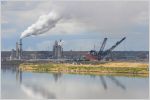Published in iPolitics (July 4, 2012)
With the passage of the omnibus budget bill, the Harper government has begun downloading oversight and dismantling environmental protection in order to expedite oilsands development and pipelines to new markets. Harper’s cabinet ministers frequently remind Canadians that increased oilsands development is needed to generate the tax revenue needed to support delivery of the services and programs we all hold dear, like education and healthcare.
But over the past several months that mantra has been challenged, with various think-tanks, analysts and pundits fuelling an important discussion about the economic impacts — both positive and negative — of booming oilsands development.
The recent analysis and debate has narrowly focused on whether or to what extent Canada’s economy may already be suffering from “Dutch disease” — the term coined to describe the Netherlands’ experience when booming offshore natural gas development led to an appreciating exchange rate that made manufactured goods too expensive to export, ultimately leading to the decline of the manufacturing sector.
The Institute for Research on Public Policy found that Canada “suffers from a mild case of the Dutch disease,” and the OECD similarly noted that resource development in Western Canada is causing economic imbalance across the country. On the flip side, the Macdonald-Laurier Institute released a brief commentary, which largely recycles rather rosy projections of economic benefits across Canada, concluding, “While the so-called ‘Dutch Disease’ mechanism may operate, in practice it is...offset by the gains to the overall Canadian economy.”
Just this week, the Canadian Chamber of Commerce weighed in, rightly noting that, “A complex transition is taking place in the economy, only part of which is driven by the resources boom and the high dollar.” But as with other analyses, the Chamber’s paper downplayed the economic downsides of the oilsands boom, all too readily dismissing regional imbalances by suggesting that other regions will benefit from the oilsands sector’s growing demand for parts, machinery and equipment, fabricated metal as well as professional, technical, finance and transportation services.
This assumption, and the associated “good news” conclusion, is undermined by one of the attendant benefits of oilsands development: rising wages. Wages across the country have risen as labour demand in the oilsands has soared, driving up wages across regions and sectors. While this upward trend is undoubtedly positive, it also means that potential Canadian providers of goods and services to the oilsands sector are less competitive than offshore providers, a fact that has some oilsands companies looking to outsource aspects of production as a means to cutting costs.
The Pembina Institute’s recent report, In the Shadow of the Boom: How oilsands development is re-shaping Canada’s economy, argues the challenges facing Canada go well beyond the classic case of Dutch disease. Our diagnosis of “oilsands fever” is based on symptoms beyond the relative performance of the manufacturing versus resource sector; we also consider the economic challenges of oil price volatility and its impacts on private and public sector fortunes, along with Canada’s inattention to energy markets that are shifting from energy commodities to energy technologies.
In the matter of oil price volatility and its impacts on public coffers, there are lessons to be learned from Alberta’s rollercoaster experience of booms and busts. Alberta’s GDP growth exceeded all other provinces from 2003 to 2007 but experienced the largest drop in GDP growth during the recent recession, when it went from plus 6.5 per cent in 2006 to minus 4.8 per cent in 2009. Between 2008 and 2009, oilsands investments in Alberta dropped by nearly 50 per cent, or $10.1 billion. The provincial government’s revenue followed the same cycle, swinging from a surplus of $8.5 billion to a $1.4 billion deficit over the same period. With oil prices recently sliding below $80 per barrel, Alberta’s fortunes are increasingly uncertain given the province budgeted for revenues tied to oil prices of around $100 per barrel.
Yet the Harper government remains seemingly aloof as to how this volatility could affect federal coffers, instead selling Canadians on oilsands development premised upon billions per year in anticipated tax revenues. This despite the fact that the very nature of oil markets — cyclical, volatile and unpredictable — fails to offer the stable revenues needed to sustainably support government spending.
In the longer term, Canada faces a more fundamental challenge in how we position ourselves for an energy economy shifting away from fossil fuels. Global investment in renewable power trumped fossil fuel investment for the first time in 2011 ($187 billion versus $157 billion, respectively), and the overall clean energy economy is projected to grow from $1 trillion per year now to upwards of $2 trillion by 2020. While other countries focus on developing energy technologies to compete in the future, the Harper government seems content to focus on increasingly outmoded fossil fuel resources, while ignoring opportunities to carve out a competitive niche for Canada in the lucrative clean energy economy.
The debate about Dutch disease has been productive insofar as it has alerted Canadians to some of the economic downsides of the oilsands boom, but broader consideration of issues including economic volatility and future competitiveness is needed if we are to inoculate our economy from oilsands fever.
Dan Woynillowicz is co-author of the report In The Shadow Of The Boom: How Oilsands Development Is Re-shaping Canada’s Economy.
Dan was a policy analyst with the Pembina Institute, and was communications director until 2012.



